'If we don't, who will?': Local organizers share why they're marching against the Milwaukee RNC
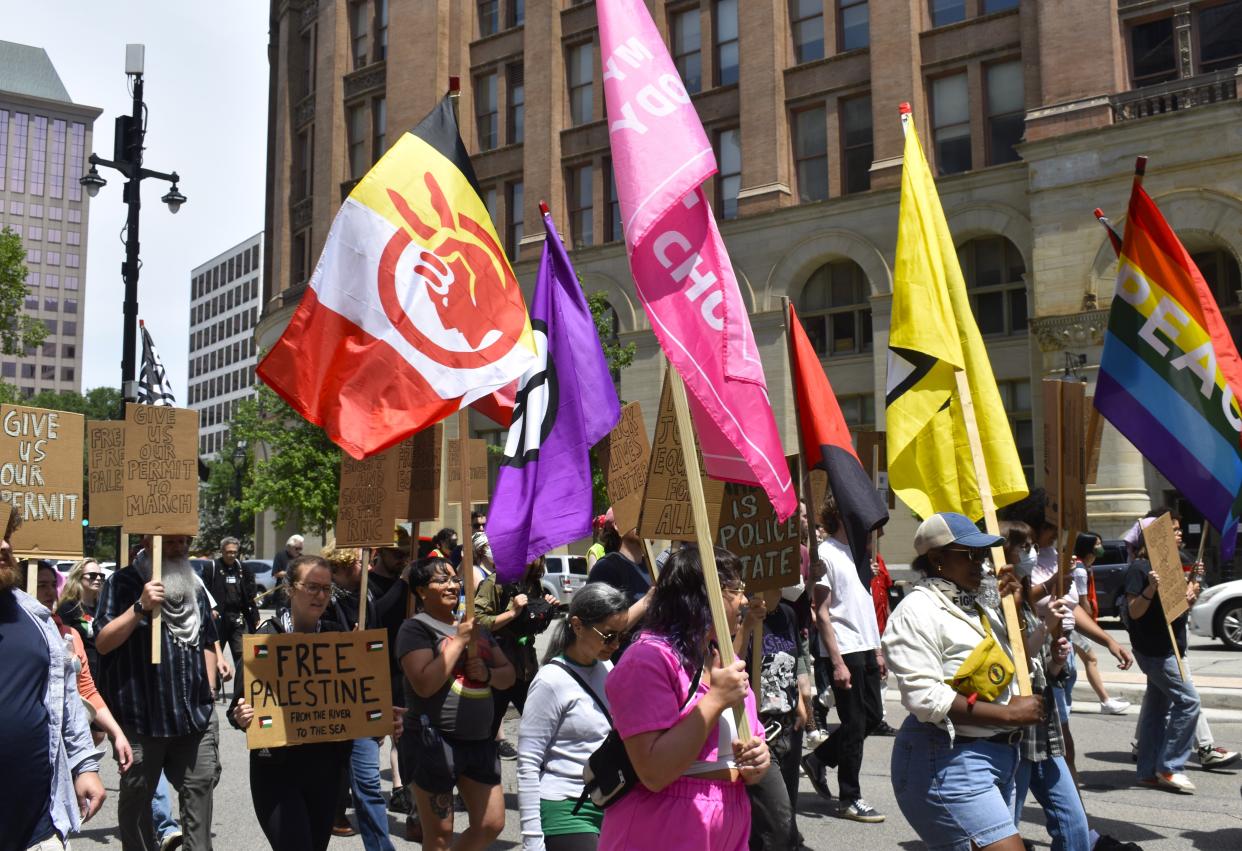
Before Alan Chavoya, 29, can join the Coalition to March on the RNC's weekly meeting, he has to step aside to take a call.
Chavoya just found out that Milwaukee police shot two teens on Interstate 43. Now, he's making sure members of the Milwaukee Alliance Against Racist and Political Repression are at the scene to gather details, in an effort to ensure police are transparent about what led to the shooting.
"This work doesn't stop," said Chavoya.
Later, he'll help orchestrate a press release from MAARPR demanding timely release of footage from the incident. For now, Chavoya has to get back to the coalition's Thursday night meeting.
Chavoya got married less than two years ago. He's also completing his Ph.D. as he teaches philosophy at Milwaukee Area Technical College. Luckily, Chavoya isn't a stranger to juggling his life with community activism.
"I'm committed to change," Chavoya said. "That's something that I recognized as a fairly young person."
The Coalition to the March on the RNC consists of local and national organizations — including Reproductive Justice Action Milwaukee, the Milwaukee Anti-War Committee and MAARPR — that plan to come together to protest the Republican National Convention on July 15.
While all the groups' individual missions vary, some of the coalition's shared goals include defending immigrant, abortion and LGBTQ+ rights, and standing with Palestinians.
Many involved with the coalition are in support of socialist movements. And most are equally disillusioned with President Joe Biden and the Democratic Party, and participated in the Coalition to March on the DNC in 2020. The Democratic Party of Wisconsin declined to talk about the group, and the Wisconsin GOP did not respond to requests for comment.
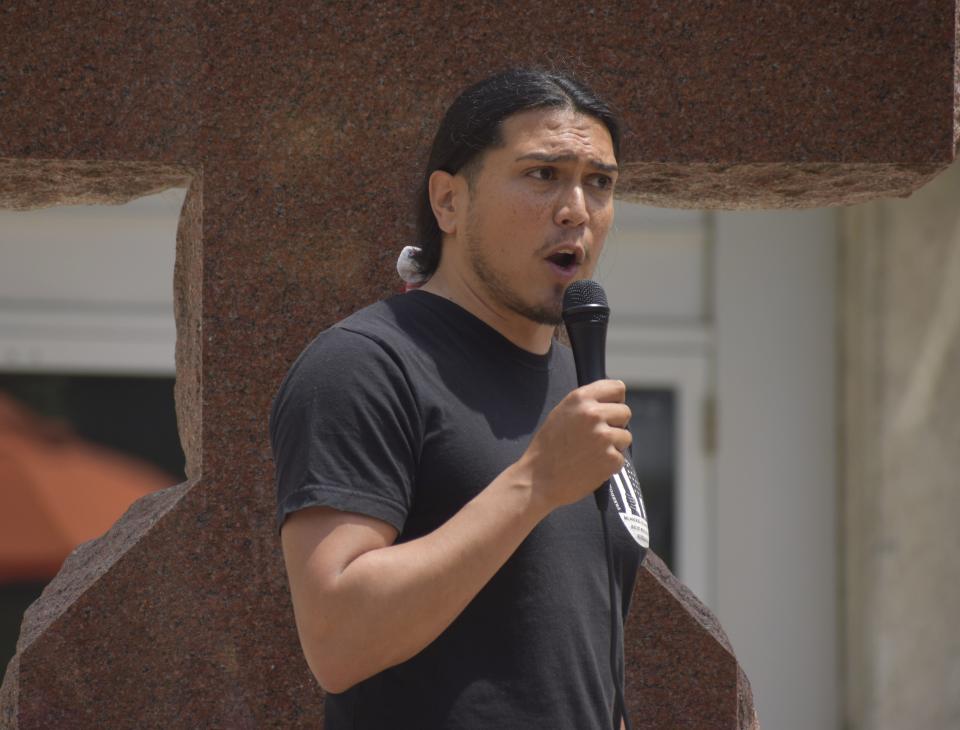
Organizers said most of their efforts to plan the upcoming demonstration are behind the scenes, and they started about two years ago.
In recent months, the coalition held several discussions with the city over its desired protest route, but could not come to an agreement. The group is now being represented by the American Civil Liberties Union of Wisconsin in an ongoing lawsuit against the city. The lawsuit argues the city is violating protesters' First Amendment rights by barring them from marching within "sight and sound" of the convention.
From growing up as a child of immigrants to witnessing police violence, each coalition leader said they have their own reason to organize.
"Organizing just doesn't feel like a choice," said Omar Flores, co-chair of the Coalition to March on the RNC. "I couldn't live with myself if I didn't do it. And I feel like I have to do it right."
"Because if we don't, who will?" he said.
Omar Flores never thought he'd become the voice of a movement
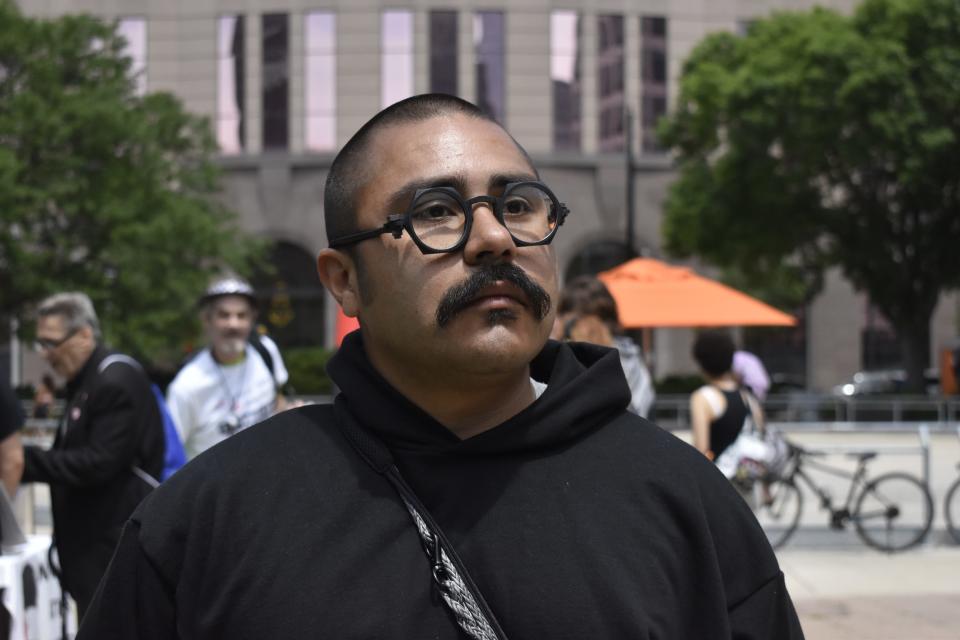
Reporters surround Flores as he delivers speeches at the coalition's weekly press conferences, often held in response to the city's latest announcements about RNC.
But as an introvert who used to prefer the "background work" of organizing, Flores said he never pictured himself as a spokesperson.
"It's still insane to me every day," said Flores, a 30-year-old Milwaukee resident.
He started organizing in Milwaukee in 2014, inspired by the uprising in Ferguson in response to a police officer fatally shooting unarmed Black teenager Michael Brown.
Today, Flores works in IT, but his second, unpaid full-time job is organizing the protest for the RNC. This includes facilitating the coalition's calls, press conferences and emails, meeting with city officials and recruiting organizers from across the country.
At first, Flores said he faced criticism from other activists for avoiding "putting himself out there."
"I took that criticism very seriously," Flores said.
So, he began speaking more, he said, and networking with other organizers, which he quickly realized was necessary "to actually get anything done."
Flores said he's motivated by the hundreds of people killed by police every year in the United States.
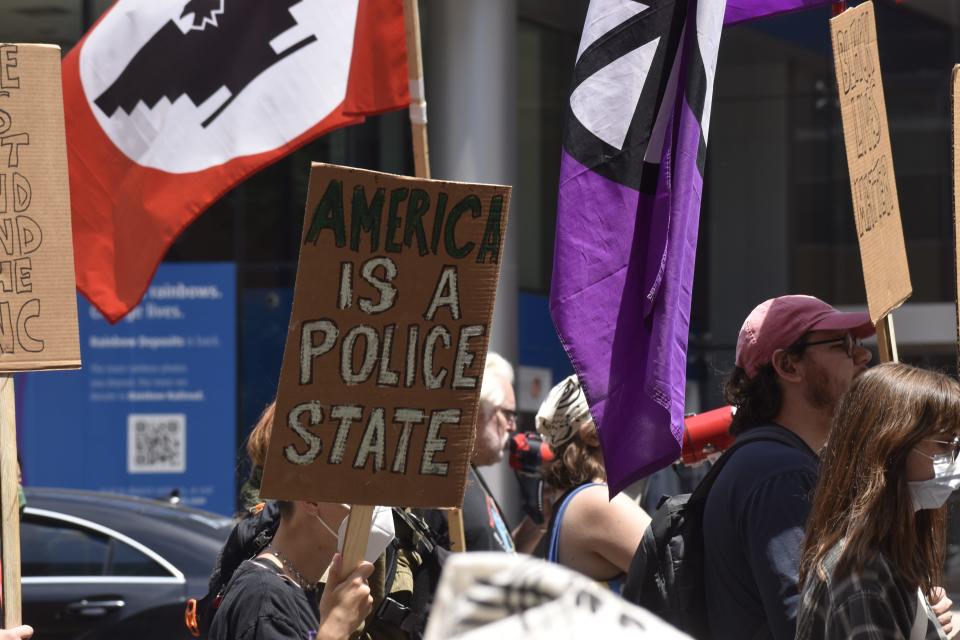
For example, as a member of MAARPR, he advocated for policy passed last year that requires footage of fatal police shootings and similar incidents to be publicly released after 15 days. Milwaukee's Fire and Police Commission later agreed to suspend this policy during the RNC.
Flores said he can't unsee what he's uncovered through his years of advocacy.
"Even if I wanted to stop — which I have, believe me, I'm very tired of doing this — I just couldn't," Flores said.
He protested the Vietnam War. He's still advocating for peace today
Brian Verdin, 71, said he's been an activist in Milwaukee since he was a high schooler in 1967 protesting the Vietnam War.
Now, as a member of the coalition and MAARPR, he's helping to organize the march on the RNC.
Because he was raised in a "union family," Verdin said, he learned the importance of community involvement early on.
Verdin said he has been protesting Milwaukee police since an officer fatally shot his friend Jacqueline Ford, a 19-year-old Black woman, in 1972. Today, he's still calling for an end to police violence, as well as violence caused by war.
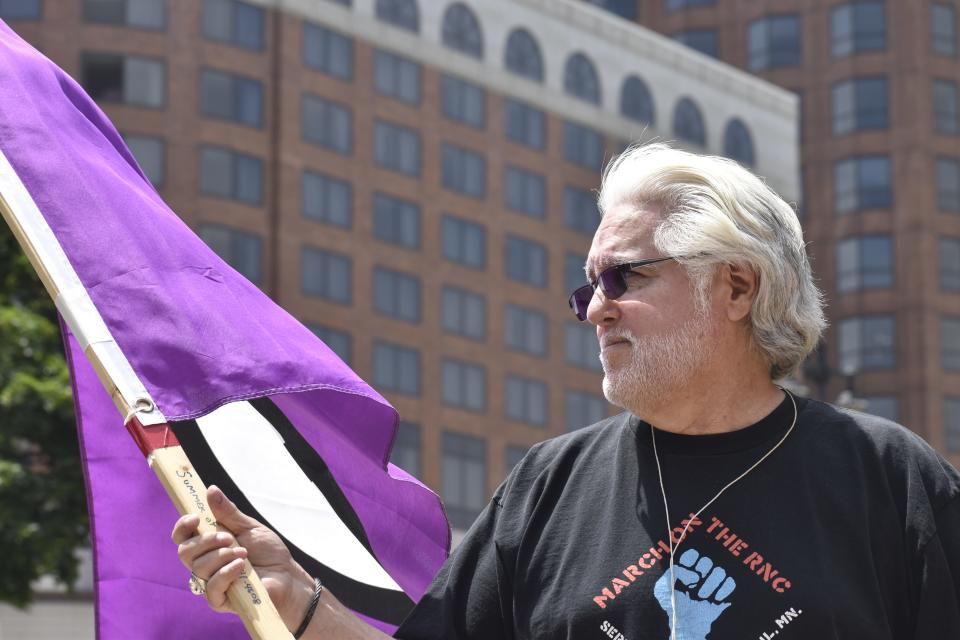
"I've just witnessed so much injustice in my lifetime," said Verdin. "So, to do nothing would be kind of pitiful."
As he's watched Milwaukee activism evolve, Verdin said he's been encouraged by recent pro-Palestinian protests across local college campuses.
"Back in the day, we used to run off hundreds and thousands of fliers and pass them on the streets in order to get people to come to stuff," he said. "Now you got Facebook, TikTok, Instagram."
Because both parties have a history of approving large military budgets, Verdin said he'd also protest against the DNC if it was coming to Milwaukee this summer.
"It'd be nice if we start spending money for peace and jobs instead of war," Verdin said. "It'd be really a great thing for the world."
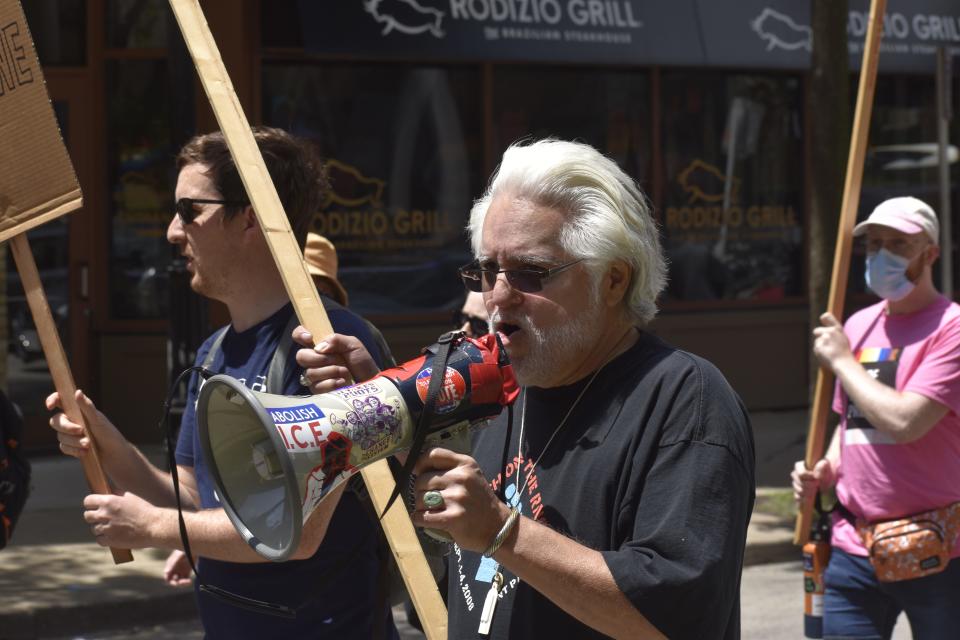
'I'm not just doing this for myself'
When Milwaukee resident Aurelia Ceja isn't working as a carpenter, they're doing "a little bit of everything" in preparation for the march on the RNC. For example, Ceja plans coalition meetings and creates the graphics used by the group on social media.
Ceja, 25, said they ensure the coalition's social media presence outlines what it believes in, including supporting Palestinians and defending reproductive rights.
"Because we're not just marching on the Republicans for nothing," said Ceja. "We're marching on the Republicans in defense of those things and fighting for those things."
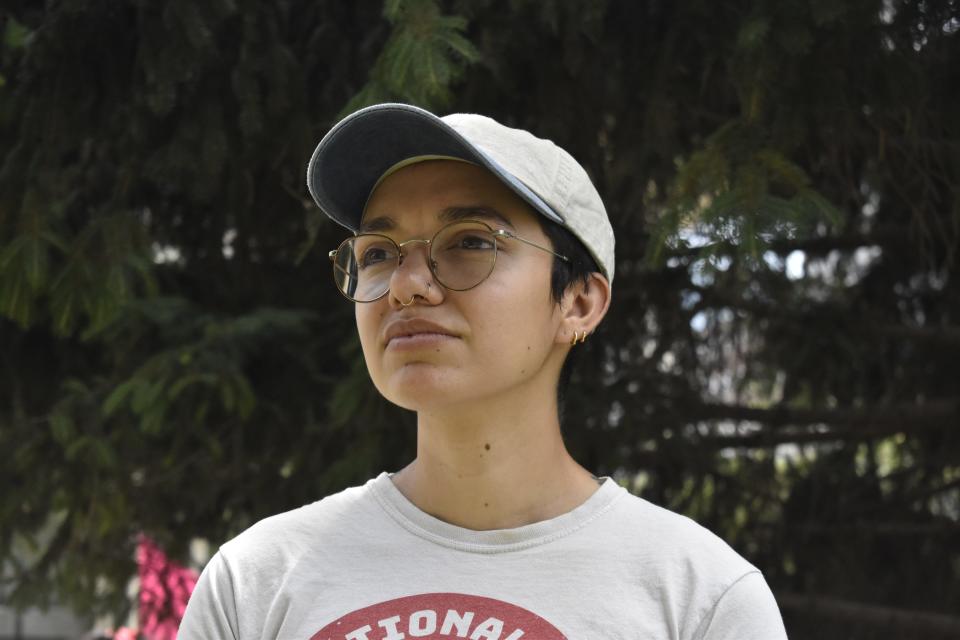
As a MAARPR co-chair, Ceja said they've been organizing in Milwaukee for seven years, since they first began advocating for immigrant rights as a college student.
Ceja said they feel revitalized when fellow organizers show up to fight for the same things they're fighting for.
"I'm not just doing this for myself," Ceja said. "I'm doing this for so many others who are fighting for themselves, their family members, their friends, or loved ones. And so, at the end of the day, it's not just about me and how I feel. It's about Milwaukee — it's about the community that I really, really love."
She watched gentrification change Atlanta. Now, she fears Milwaukee is next
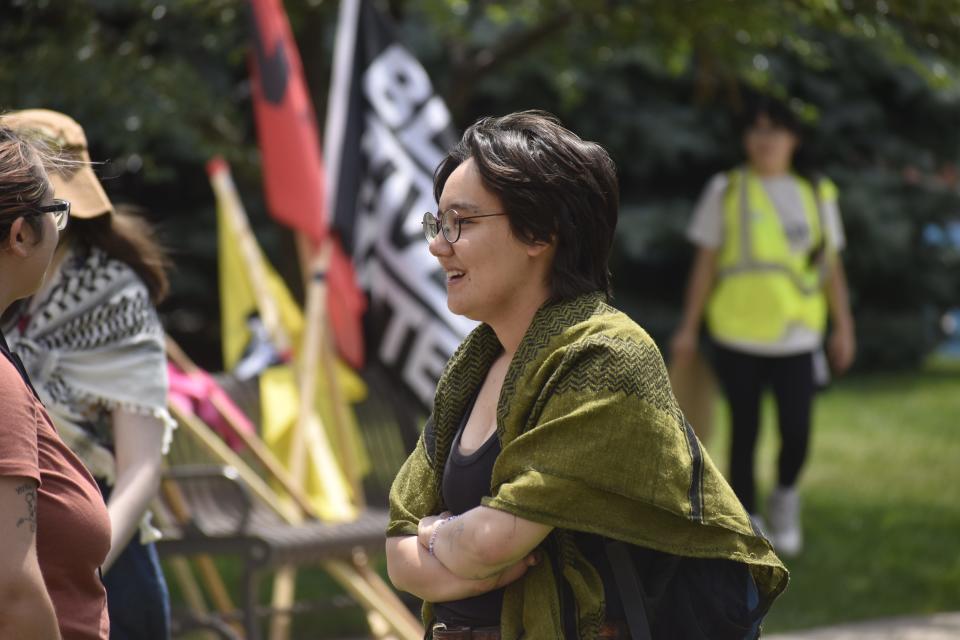
Casey Serrano, outreach co-chair for the Coalition to March on the RNC, said she moved from Atlanta to Milwaukee a little over a year ago.
Serrano, 23, said organizing in Atlanta was "intense" as she watched it become increasingly gentrified.
"Even when I think back to when I was starting high school versus now, the city and the neighborhood I lived in has completely changed, which creates the sense that we're losing it," said Serrano, "and that we have to get it back, or fight for it back."
That sense of urgency isn't as prevalent in Milwaukee, she said, but that doesn't mean gentrification isn't happening here.
"It's slower, and it's smaller, and that's worth fighting for in a lot of ways," Serrano said.
Serrano said a common misconception about protests is that they're secretly planned at the last minute. But as someone who volunteers for the coalition daily outside of her regular work hours, Serrano said that's not the case.
"A lot of it is just that day-to-day logistics, planning, outreach, networking," she said.
Traveling from the south side to the suburbs taught Alan Chavoya hard lessons
Chavoya grew up on the south side of Milwaukee, but much of his childhood was spent playing soccer in Mequon.
He remembers the difference between the police at teammates' houses in Mequon or Cedarburg compared to where he lived.
"The police presence was pretty negligible in those areas," Chavoya said. "They weren't as active, and the kids were a lot more free to run around."
In contrast, Chavoya said any time there was a group of three more kids playing soccer in the park in his neighborhood, they'd be questioned by police. He remembers being approached by squad cars during the day from as young as 12 years old.
"It's traumatic, but it's something that motivates me to at least continue to be involved to put an end to that," Chavoya said.
Inspired by his experience as a child of Mexican immigrants, Chavoya said his activism began in high school. He renewed his efforts after George Floyd's death sparked mass protests in both Milwaukee and across the country.
He said MAARPR helped him realize how issues within the immigration system and the criminal justice system overlapped.
"The criminal justice system, and the immigration system over the two decades, have been getting closer and closer, in which immigration crimes are treated as criminal crimes and, oftentimes, punished as such," Chavoya said.
Chavoya is aware of the inherent risks involved in protesting, especially since many members were in Kenosha when Kyle Rittenhouse fatally shot two protesters in 2020.
However, he says coalition members have learned from those experiences, ensuring medics are ready to help.
"Even though that threat is always there," Chavoya said, "we can't be afraid of it and let that fear lead to inaction."
Quinn Clark is a Public Investigator reporter. She can be emailed at [email protected]. Follow her on Twitter at @Quinn_A_Clark.
This article originally appeared on Milwaukee Journal Sentinel: Milwaukee organizers share why they're marching against the RNC
